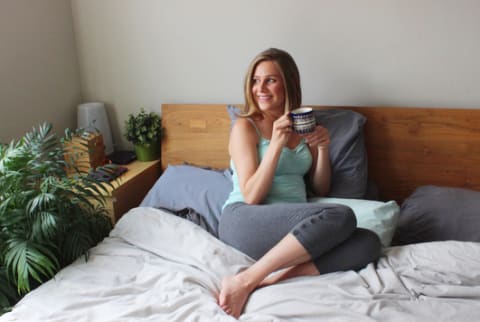Advertisement


As a doctor and sleep expert, I'm often asked what's the best type of bed: hard, soft, memory foam, futon, etc. There's actually no one right answer. I think we overrate the idea that any particular kind of mattress is better for your back. Is a hard or soft or medium mattress most comfortable for you? Then there's your answer.
But I do urge you to consider investing in an organic mattress and organic bedding. This won't do much for your comfort—but it will help your overall health. Conventional mattresses are loaded with flame retardants, which are problematic chemicals that can be carcinogenic and endocrine disrupting (meaning they screw up your hormones). I think it's an outrage that our bed, supposedly a sanctuary for rest and rejuvenation, is loaded with toxic chemicals.
How to make your bed a nontoxic sanctuary:
Transitioning to an organic mattress and organic bedding is a hefty investment, but I believe it's worth it. We spend money on all kinds of nonsense. If we really thought through our budget, any money spent on a mattress that improves sleep and health pays dividends.
I recommend looking for organic mattresses free of flame retardants. Latex and wool are two of the more natural mattress materials available. For your comforters and pillows, wool is often the best option. There are some synthetic comforters out there that pass the bar as well. I also recommend opting for organic cotton sheets and duvet covers.
But beware the "green-washed" mattress brands. There are a lot of brands marketing themselves as natural, but it often means they've added one or two natural ingredients to an otherwise toxic product, and they use the color green in their logo. This does not a natural mattress make. Do your research, ask about flame retardants, and look for certifications like Greenguard Gold, GOTS, GOLS, and USDA organic.

Ellen Vora, M.D. is a board-certified psychiatrist, acupuncturist, and yoga teacher, and she is the author of the No. 1 bestselling book The Anatomy of Anxiety. She takes a functional medicine approach to mental health—considering the whole person and addressing imbalance at the root. Vora received her B.A. from Yale University and her M.D. from Columbia University.

Ellen Vora, M.D. is a board-certified psychiatrist, acupuncturist, and yoga teacher, and she is the author of the No. 1 bestselling book The Anatomy of Anxiety. She takes a functional medicine approach to mental health—considering the whole person and addressing imbalance at the root. Vora received her B.A. from Yale University and her M.D. from Columbia University.